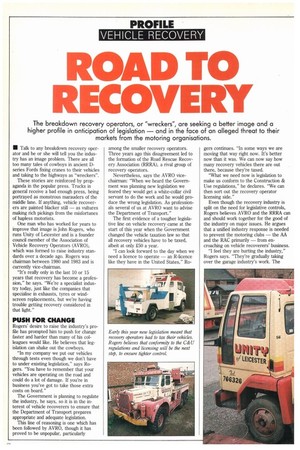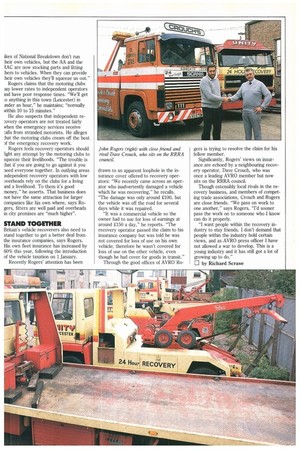ROAD TO RECOVERY
Page 42

Page 43

If you've noticed an error in this article please click here to report it so we can fix it.
The breakdown recovery operators, or "wreckers", are seeking a better image and a higher profile in anticipation of legislation — and in the face of an alleged threat to their markets from the motoring organisations.
• Talk to any breakdown recovery operator and he or she will tell you the industry has an image problem. There are all too many tales of cowboys in ancient Dseries Fords fixing cranes to their vehicles and taking to the highways as "wreckers".
These stories are reinforced by propaganda in the popular press. Trucks in general receive a bad enough press, being portrayed as monstrous marauders of the middle lane. If anything, vehicle recoverers are painted blacker still — as vultures making rich pickings from the misfortunes of hapless motorists.
One man who has worked for years to improve that image is John Rogers, who runs Unity of Leicester and is a founder council member of the Association of Vehicle Recovery Operators (AVRO), which was formed to raise industry standards over a decade ago. Rogers was chairman between 1980 and 1983 and is currently vice-chairman.
"It's really only in the last 10 or 15 years that recovery has become a profession," he says. "We're a specialist industry today, just like the companies that specialise in exhausts, tyres or windscreen replacements, but we're having trouble getting recovery considered in that light."
PUSH FOR CHANGE
Rogers' desire to raise the industry's profile has prompted him to push for change faster and harder than many of his colleagues would like. He believes that legislation can shake out the cowboys.
"In my company we put our vehicles through tests even though we don't have to under existing legislation," says Rogers. "You have to remember that your vehicles are operating on the road and could do a lot of damage. If you're in business you've got to take those extra costs on board."
The Government is planning to regulate the industry, he says, so it is in the interest of vehicle recoverers to ensure that the Department of Transport prepares appropriate and adequate legislation.
This line of reasoning is one which has been followed by AVRO, though it has proved to be unpopular, particularly among the smaller recovery operators. Three years ago this disagreement led to the formation of the Road Rescue Recovery Association (RRRA), a rival group of recovery operators.
Nevertheless, says the AVRO vicechairman: "When we heard the Government was planning new legislation we feared they would get a white-collar civil servant to do the work and he would produce the wrong legislation. As professionals several of us at AVRO want to advise the Department of Transport."
The first evidence of a tougher legislative line on vehicle recovery came at the start of this year when the Government changed the vehicle taxation law so that all recovery vehicles have to be taxed, albeit at only £50 a year.
"I can look forward to the day when we need a licence to operate — an R-licence like they have in the United States," Ro gers continues. "In some ways we are moving that way right now. It's better now than it was. We can now say how many recovery vehicles there are out there, because they're taxed.
"What we need now is legislation to make us conform to the Construction & Use regulations," he declares. "We can then sort out the recovery operator licensing side."
Even though the recovery industry is split on the need for legislative controls, Rogers believes AVRO and the RRRA can and should work together for the good of the industry on major issues. He argues that a unified industry response is needed to prevent the motoring clubs — the AA and the RAC primarily — from encroaching on vehicle recoverers' business.
"I feel they are hurting the industry," Rogers says. "They're gradually taking over the garage industry's work. The ikes of National Breakdown don't run heir own vehicles, but the AA and the RAC are now stocking parts and fitting hem to vehicles. When they can provide heir own vehicles they'll squeeze us out."
Rogers claims that the motoring clubs oay lower rates to independent operators ind have poor response times. "We'll get to anything in this town (Leicester) in mder an hour," he maintains; "normally within 10 to 15 minutes."
He also suspects that independent re:overy operators are not treated fairly when the emergency services receive :ails from stranded motorists. He alleges that the motoring clubs cream off the best nf the emergency recovery work.
Rogers feels recovery operators should fight any attempt by the motoring clubs to squeeze their livelihoods. "The trouble is that if you are going to go against it you need everyone together. In outlying areas .ndependent recovery operators with low overheads rely on the clubs for a living and a livelihood. To them it's good money," he asserts. That business does not have the same attraction for larger companies like his own where, says Rogers, fitters are well paid and overheads in city premises are "much higher".
STAND TOGETHER
Britain's vehicle recoverers also need to stand together to get a better deal from the insurance companies, says Rogers. His own fleet insurance has increased by 60% this year, following the introduction of the vehicle taxation on 1 January.
Recently Rogers' attention has been drawn to an apparent loophole in the insurance cover offered to recovery operators: "We recently came across an operator who inadvertently damaged a vehicle which he was recovering," he recalls. "The damage was only around £100, but the vehicle was off the road for several days while it was repaired.
"It was a commercial vehicle so the owner had to sue for loss of earnings at around £150 a day," he reports. "The recovery operator passed the claim to his insurance company but was told he was not covered for loss of use on his own vehicle; therefore he wasn't covered for loss of use on the other vehicle, even though he had cover for goods in transit."
Through the good offices of AVRO Ro
gers is trying to resolve the claim for his fellow member.
Significantly, Rogers' views on insurance are echoed by a neighbouring recovery operator, Dave Crouch, who was once a leading AVRO member but now sits on the RRRA council.
Though ostensibly local rivals in the recovery business, and members of competing trade associations, Crouch and Rogers are close friends. "We pass on work to one another," says Rogers, "I'd sooner pass the work on to someone who I know can do it properly.
"I want people within the recovery industry to stay friends. I don't demand that people within the industry hold certain views, and as AVRO press officer I have not allowed a war to develop. This is a young industry and it has still got a lot of growing up to do."
o by Richard Scrase
















































